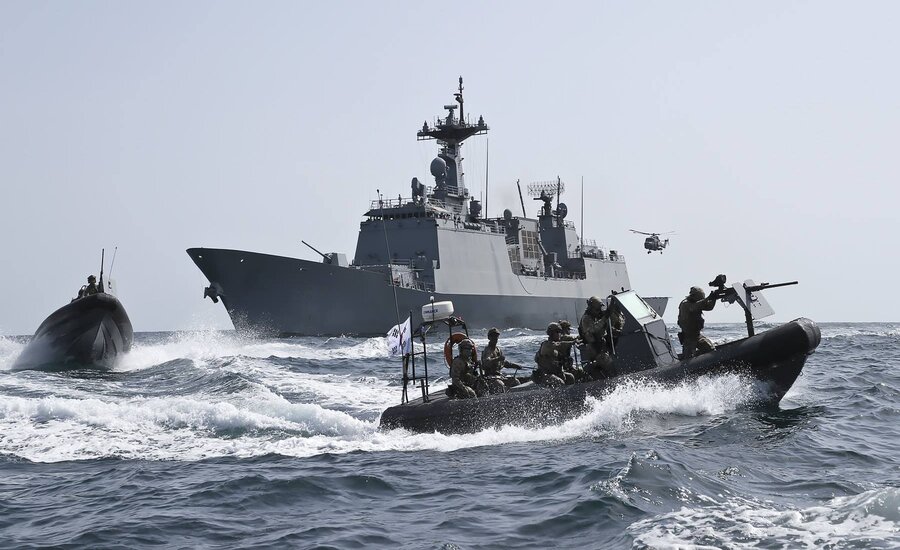South Korea is sending military forces to respond to Iran’s seizure of one of its oil tankers, an initiative in which it seeks to work with other nations operating in the region.
Iran’s elite Revolutionary Guard announced on Monday that its Zulfiqar fleet had seized a South Korean ship operating in the Islamic Republic’s First Naval District in the Persian Gulf “due to a series of violations of maritime environmental laws” after he left from the Al-Jubail port of Saudi Arabia.
The ship, Hankuk Chemi, said they were carrying up to 7,200 tonnes of petroleum-based chemicals and a crew of South Korean, Indonesian, Vietnamese and Myanmar citizens. Both the ship and the crew are detained in the port of Bandar Abbas, Iran, where the Revolutionary Guard said that “the matter will be dealt with by judicial officials”.
In response to the incident, a South Korean defense ministry official said Newsweek the country, officially known as the Republic of Korea (ROK), had “sent anti-piracy troops near the Strait of Hormuz to the ROK tanker directly.”
Asked whether South Korea would seek support from the International Maritime Security Construct, a U.S.-led coalition of at least nine nations designed to prevent acts of sabotage and prevent Iran from seizing international ships after a hectic 2019 near the Strait of Hormuz, he said the Seoul official sought “close cooperation with the ROK government anti-piracy troops and multinationals.”
The Strait of Hormuz is the most important bottleneck for marine oil traffic in the world and a recurring focus for U.S.-Iran tensions and threats that have increased severely since Donald Trump took office in 2017.
The US Central Command’s 5th Navy Fleet did not immediately respond to the Newsweekto comment.
The United States and South Korea are military allies, and although their mutual defense has been established to repel attacks by rival North Korea, it forces each to come to the aid of the other in the event of any “external armed attack”.

Republic of Korea Navy
Anxieties about possible escalations in the Persian Gulf increased especially around the one-year anniversary, last weekend, of the death by the USA of the Quds Revolutionary Force commander, Major General Qassem Soleimani, in Iraq.
The Iranian permanent mission to United Nations spokesman Alireza Miryousefi recently denounced the death of the influential and controversial Iranian military leader last year as “something that was almost universally condemned as an illegal and terrorist act (even by US allies) ). ” He added that “it did not affect Iran’s national security policy.”
“What he has done is to illustrate to the whole world the true nature of the government in disregarding international law and standards, and the desperation it feels at its inability to bring Iran to its knees,” he said. Newsweek. “Iran has supported Trump and his allies and will continue with its foreign and security policies as it always has.”
Miryousefi added a warning.
“There is an appearance that the United States is setting traps or provocations to provide an excuse to start an armed conflict in the last days of the government,” he said. “Iran is fully prepared to defend itself and, if it does, it will react openly and decisively.”
The US military has flown twice with nuclear-capable B-52 bombers over the Middle East in recent weeks, in a show of strength against the Islamic Republic, which Trump has accused of conspiring to attack US interests following an attack by rocket that hit the Washington embassy in Baghdad last month.
The United States leader was just over two weeks away, but he refused to acknowledge the electoral victory of his rival, President-elect Joe Biden, who signaled a more diplomatic approach to Iran. The uncertainty about Trump’s actions spread globally, and friends and foes kept a close eye on US movements.
O USS Nimitz The aircraft carrier was due to leave the region, but has received abrupt orders to remain due “to the recent threats made by Iranian leaders against President Trump and other US government officials”, according to a statement released on Sunday by the Secretary of Defense acting, Chris Miller. “No one should doubt the determination of the United States of America,” he added.

TASNIM NEWS / AFP / Getty Images
South Korea’s Ministry of Foreign Affairs has requested the early release of Hankuk Chemi, the last international ship to be seized by the Revolutionary Guard, who has a history of detaining foreign vessels considered dangerous to sea traffic or in violation of nearby rules or within the critical intersection.
Iranian Foreign Ministry spokesman Saeed Khatibzadeh said additional information about the incident would be released soon, but said that “the matter is purely technical” and is related to the alleged waterway pollution by the ship.
“The Islamic Republic of Iran, like other countries, is sensitive to such violations, especially pollution of the marine environment, so it will deal with it within the framework of the law,” said Khatibzadeh. “This incident is not exceptional and has occurred in similar cases in Iran and in the waters of other countries, and it is normal.”
The incident occurred at a time when South Korean Foreign Minister Kang Kyung-wha was due to travel to Tehran.
South Korea was one of Iran’s main oil buyers before the Trump administration imposed sanctions following the unilateral withdrawal from the U.S. of a 2015 nuclear deal in 2018. Tehran officials have since urged Seoul to release billions of dollars in assets Iranians frozen by South Korea as a result of their adherence to U.S. sanctions, although South Korea has so far refused, despite successive meetings on the issue.
Iran also has friendly ties with North Korea, another US-sanctioned state with which South Korea has struggled to improve relations amid an unprecedented peace process launched when Washington left the nuclear deal with Iran, two and a half years ago.
